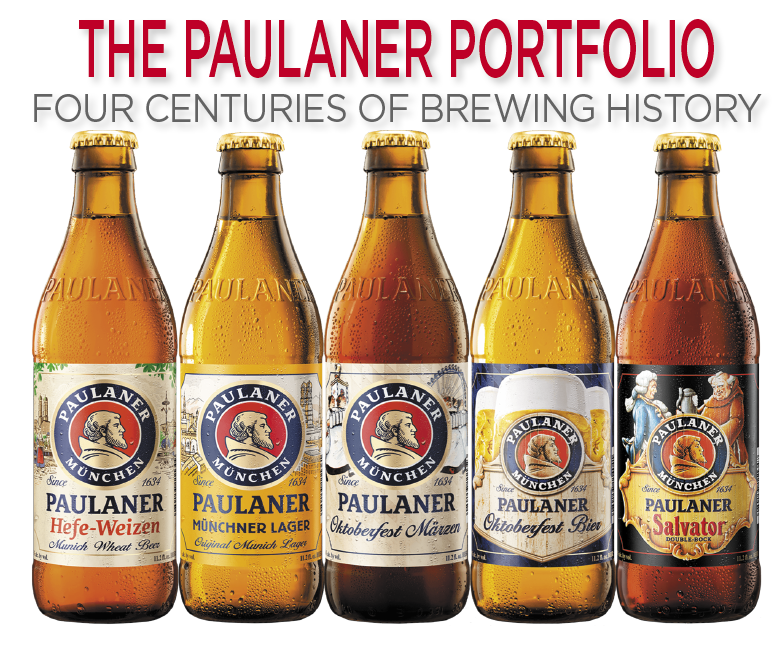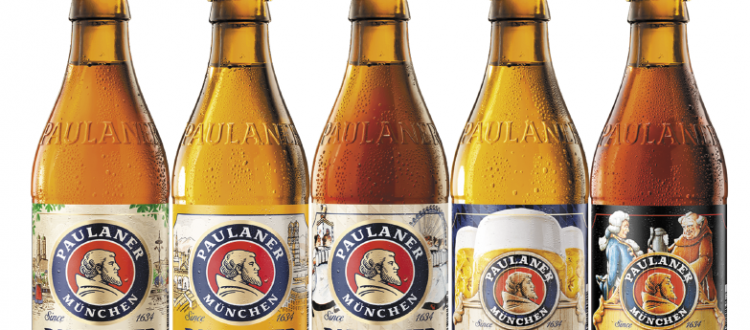THE PAULANER PORTFOLIO
 By Andy Crouch
By Andy Crouch
Dating to at least 1634, the Paulaner Brewery is one of the pillars of German brewing and a giant in its home city of Munich. For nearly 4OO years, the brewery has supplied beer to the local community and now more than 7O countries with production of more than 1.7 million barrels a year. One of the six breweries allowed to pour beer at the annual Oktoberfest in Munich, Paulaner hosts a rowdy and fun tent during the celebration. Paulaner brews a well-respected line of traditional German beers for home consumption and export. Some beers have been renamed for international distribution while the recipes remain the same. Let’s take a look at the Paulaner portfolio and delve into the brewery’s history through these classic styles.
PAULANER HEFE-WEIZEN alcohol by volume 5.5%
The Paulaner Hefe-weizen is a globally respected weiss beer and the most popular wheat beer in Germany. It pours with a striking hazy, luminous orange color and a substantial, rugged head of foam. True to style, Paulaner’s weiss beer possesses a strong clove bouquet mixed with some peppery hints and very low hop levels. Brewed with 6O percent malted wheat in the mash, it boasts an airy and pleasing body filled with notes of banana, clove, and light black pepper over a smooth, slightly sweet malt character. A classic and well-balanced weiss beer that serves both novice and advanced audiences.
PAULANER MUNICH LAGER alcohol by volume 4.79%
While Octoberfest and Marzen beers get a lot of the attention, Helles is the most popular style in its home city of Munich. A classic and easy drinking style, bright and beaming, Helles (pronounced ‘hell-us’) offers drinkers a great balance of flavors. First brewed in the late nineteenth-century by Bavarian brewers to compete with their Czech rivals, this classic lager heralds a mild yet grainy malt flavor and possesses a light and sometimes spicy hop bitterness. While a touch hoppy, the smooth-drinking and bready Munich malt flavor is key to the popularity of the style, which is often sold under the generic Lager designation in southern Germany. With a sustainable, tight white head of foam and striking golden color, a glass of the clean, medium-bodied Helles is sure to catch your eye and convince you to order another round. Paulaner’s version is another classic of the style. A bit on the lighter side compared to smaller producers, the beer is labeled as Munich Lager for export while called Munchner Hell in its home city. Bright and sparkling in appearance and topped with a solid white head of foam, it begins with a wash of sweet German malts followed by mild hits of a light, peppery hop bite that keeps everything together.
PAULANER OKTOBERFEST MARZEN alcohol by volume 6.O%
One of the most popular seasonal beers in history, Oktoberfest and its close sibling (or twin according to many) Marzen derive their history from Munich. Developed by Gabriel Sedlmayr II, owner of the Spaten Brewery, in association with his brother Josef and adapting the Vienna style created years earlier by Anton Dreher, the amber-hued, full-bodied, toasted malt lager is served during the annual Oktoberfest celebration. Sometimes known as “Fest” beer, the Marzen was originally brewed in spring and cellared during the warm summer months for service in the fall, a practice less followed with modern refrigeration.
Paulaner’s version dates from 1818 and it became one of the fest’s most popular beers. With a big, bold auburn hue and solid dollop of off-white creamy foam, Paulaner Oktoberfest Marzen is all German malt in the nose with only mild hints of classic noble hops, including Hallertauer. As times and palates change, so must the beer industry, even 4OO-year-old European classics. You won’t find this beer at Oktoberfest, for reasons described below, but it is available in the United States due to demand.
PAULANER OKTOBER WIESN BEER alcohol by volume 4.9%
When fall begins, dreams of Oktoberfest start. Lederhosen, large mugs of beer, and crowds singing in chorus, the event is a global beer icon. What many do not know, however, is that there are two competing styles of beer at the event. The original Oktoberfest beer is strong, full bodied, and full of malt character. Unsurprisingly, when consumed by the liter, the style can tend to weigh on the bodies and minds of its consumers. In 1953, another local brewery, Augustiner, released a slightly lighter version of the Marzen style and it took off with attendees. Today at Oktoberfest, Paulaner only sells its lighter Oktoberfest Wiesn version, which it calls liquid gold, reflecting its sparkling hue. The other Munich breweries also followed suit and now the heavier Marzen versions are in short supply at the fest. The Paulaner Wiesn Beer is bright and golden and the nose is filled with bright Munich malt notes and light German noble hopping. Clean and easy drinking, it’s clear why this style became more popular with festival attendees though there is no replacing the original.
PAULANER SALVATOR alcohol by volume 7.9%
If the description of Paulaner’s Oktoberfest Marzen piqued your interest, you might want to consider its stronger older brother, Salvator. The granddaddy of Doppelbocks, Paulaner has been brewing this strong beer since its beginning more than 375 years ago. This was the beer that monks shared with Munich locals and which led to the public clamor to open its tanks for commercial sales. The Marzen and Doppelbock are two distinct styles but maintain some substantial similarities.
While Marzens celebrate greater balance of malt character and strength, Doppelbocks suffer no such restraints. They boast substantial malt backbones and revel in higher alcohol levels. The Salvator offers huge notes of sweet caramel malts and warming alcohol. The -ator suffix in the beer’s name has been mimicked by many other doppelbock producers, with beer names ranging from Celebrator to Consecrator and Emancipator.
PAULANER BREWERY
MUNICH, GERMANY
Paulaner.com
Paulaner beer are available from
Atlas Distributors, Burke Distributing, Colonial Wholesale Beverage and Commercial Distributing.

